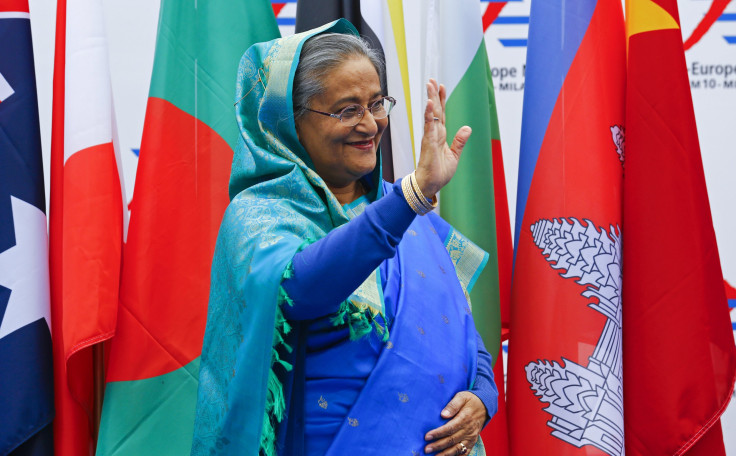Bangladesh Attracting More Foreign Investment, But Investors Have Some Worries

The once impoverished South Asian nation of Bangladesh, which boasts a huge population and cheap labor, is attracting increased investment interest from foreign countries.
In 2018, Bangladesh received foreign direct investment of $3.61 billion, the highest level ever. The World Investment Report 2019 by United Nations Conference on Trade and Development said that figure soared by 67.9% from 2017.
U.S. Acting Assistant Secretary for South and Central Asian Affairs Alice Wells recently said Washington seeks to make big investments in Bangladesh’s infrastructure and energy sectors.
“We discussed how we can improve foreign direct investments and expand American business in Bangladesh and help the country develop its ambitious goals,” she said after meeting in Dhaka with Foreign Minister Abdul Momen and Home Minister Asaduzzaman Khan Kamal.
But she cautioned that Bangladesh needs to upgrade the rule of law, maintain a free press and uphold the rules of democracy to attract more foreign investors.
“All of that comes together and makes Bangladesh an advanced society,” she added.
The U.S. Ambassador to Bangladesh Earl R. Miller said recently his government wants American companies to continue investing in Bangladesh.
“We want to introduce new technologies into the economy, bringing shared prosperity to more and more people -- benefiting both countries,” the envoy said.
Miller noted U.S. companies like Chevron (CVX), which owns a facility in Sylhet, plays a “key role” not only in Bangladesh’s energy sector, but also as a “major employer in its growing economy.”
“Chevron is working to support the local community, and I had a chance to see the positive impact the company is having in the Greater Sylhet region,” he said.
Miller also said he would like more CEOs of U.S. companies to visit Bangladesh to scout out business opportunities. But he also cautioned Bangladesh must tackle problems like human trafficking and terrorism to make foreign entities more comfortable about doing business there.
Bilateral trade between the two countries has surged from less than $500 million in 1992 to more than $8 billion now. In addition, U.S. exports to Bangladesh jumped by 43% from 2017 to 2018 to reach $2.1 billion.
“There is still great deal of potential to sell U.S. goods and services,” Miller noted. “We are already large suppliers of power turbines, soybeans and other heavy machinery. They are bringing some of the best and the most innovative techniques to Bangladesh.”
Other countries far and wide are also seeking to invest in Bangladesh.
Europe’s largest economy Germany is considering asking a luxury automaker to invest in Bangladesh and build assembly plants there.
“We agreed it would be great if a German carmaker would invest in Bangladesh,” Peter Fahrenholtz, Germany’s ambassador to Bangladesh, tweeted.
But he added Bangladesh must build “proper” infrastructure and relax administrative and legal difficulties that hamper business.
Mercedes-Benz is mulling expanding into Bangladesh. “In the case of market growth and sales potential, we are of course continuously checking the framework conditions for the expansion of passenger car production capacities," said spokesman Tobias Brandstetter.
Turkey, a fellow Muslim nation, is especially keen to invest in Bangladesh.
Bangladesh Finance Minister Mustafa Kamal has asked Ankara to make more investments in various sectors, including power and energy, science and technology, information and communications technology, shipping, agriculture, education and natural disaster management.
Turkish Minister of Culture and Tourism Mehmet Mehmet Nuri Ersoy told Kamal he would like Ankara to invest in Bangladesh’s tourism industry, calling the country a “rising economic star.”
“The relationship between Bangladesh and Turkey is very good although the trade relations hasn’t got such momentum,” Ersoy said. “So, our efforts will continue to boost the trade relations.”
In 2018, bilateral trade between Turkey and Bangladesh reached $858 million – a figure dwarfed by the 8.66 billion trade volume between Turkey and India.
Bangladeshi Prime Minister Sheikh Hasina boasted Bangladesh is “one of the fastest growing economies in the world” and “the second fastest growing economy in Asia.”
The World Economic Forum said that Bangladesh’s gross domestic product growth rate is forecast to be 8% in 2020 – versus 7.2% for India. The nation has also reduced poverty -- the number of workers living below the poverty line plunged from 73.5% in 2010 to 10.4% in 2018.
Bangladesh’s once dominant garment business is now a $30 billion industry, but the economy has diversified. The services sector which includes microfinance and computing now accounts for 53% of the country’s GDP.
Most notably, for a country long associated with extreme poverty, Bangladesh now has many wealthy people who can afford to purchase costly foreign imports. Wealth-X, a research institute in New York, said the number of high-net-worth persons in Bangladesh will grow at an 11.4% compound annual rate by 2023, a faster rate than even China and India.
Hasina added that Bangladesh has “the most liberal investment policy in South Asia,” citing “protection of foreign investment by law, generous tax holiday, concessionary duty on import of machinery, unrestricted exit policy, full repatriation of dividend and capital on exit.”
However, it’s not all rosy. This year, the World Bank ranked Bangladesh as 168th among 190 countries in its ease of doing business index (up from 176th place in 2018.) This means only 12 nations on earth have tougher rules on doing business.
While Bangladesh has made much progress, much more needs to be done.
“Setting up a new business became less expensive with the reduction of registration and name clearance fees and removal of the certifying fee for digital certificates,” the World Bank stated. “Access to credit information was improved thanks to expanded coverage by the credit information bureau. This reform delivered Bangladesh’s most significant improvement.”
Mercy Miyang Tembon, World Bank country director for Bangladesh, said to improve the business climate, "it would be important for Bangladesh to build on the recent achievement and further accelerate regulatory reform efforts."
© Copyright IBTimes 2024. All rights reserved.



















